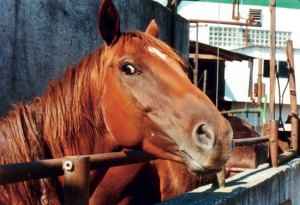
Horse in line on his way to slaughter in Texas. The plants were closed in 2007 but there is talk among State Senators to bring it back.
The slaughter of horses for human consumption overseas ended on US soil in 2007 when the remaining three plants closed, two in Texas and the other one in Illinois.
A debate took place on horse slaughter in a recent Texas State Senate Committee meeting.
Common to this discussion are the typical fallacies the pro-horse slaughter movement trots out to support the idea of killing horses for their meat.
Among the false arguments made are (i) the negative economic impact on the horse industry and (ii) the increase of abandonment and abuse of horses since slaughter plants closed in the US. Predictably they also refer to slaughter as “processing” blandly stating that it is a perfectly fine way to end a horse’s life and not inhumane.
We say false arguments because the fact routinely ignored that destroys these claims is that as many American horses are killed across US borders in Mexico and Canada per year as when they were killed for their meat on US soil. In fact, the numbers of American horses slaughtered annually may now actually be higher depending on whose statistics you rely on.
Another myth horse slaughter supporters are trying to sell is that cutting down on the distance to slaughter will reduce the abuses and cruelties inherent to it. This of course is not only an invalid but phony argument.
Horses transported to slaughter within US borders in many instances would have to travel perhaps an hour or two less than if they were sent to Canada or Mexico. Notwithstanding that, it still would in no way lessen the heinous conditions these horses on their way to slaughter are subjected to.
Also, it does not take into account horrific tractor trailer accidents where slaughter horses are maimed and sometimes killed. Horses who are injured in these deadly crashes are forced to continue their journeys to slaughter anyway; the ones whose bodies are too damaged for slaughter are turned away by the plants and abandoned to die on their own. None of this includes the many slaughter horses who must endure time spent waiting to be slaughtered in the most brutal of conditions in feedlots.
Additionally, it ignores the important fact that horses will continue to be sent across US borders to be slaughtered just as they were when plants operated on American soil.
:: Read the article about the State Senate committee meeting discussing the return of horse slaughter to Texas here.









No comments:
Post a Comment